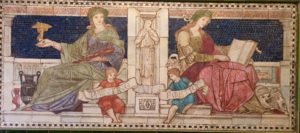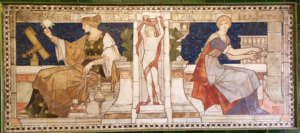For those of you who have visited Blackburn Museum and Art Gallery it would have been impossible for you to miss the impressive decorative panels in the entrance. These two panels were designed by the artist and stained glass designer John William Brown in 1901 and manufactured by James Powell & Sons, Glassmakers of Whitefriars, London. The purpose of the panels was to serve to inspire visitors as they visited either the museum or library.
The hand painted panels are a set of allegories in the form of seated maidens and the technique used to create them was opus sectile. This art technique was popular in the ancient Roman period where the materials were cut and inlaid into walls or floors to make a picture; this process differs from mosaics, where the pattern is made up of small squares.

Painting and Poetry – John William Brown, 1901
As you enter the Museum and Art Gallery, the panel on your left titled Painting and Poetry, has symbols of Painting, Poetry, Drama, Astronomy and Geometry.
A studious maiden sits composing poetry, the books suggesting the epic and the lyric.
The masks in the right hand corner of the tile represent Drama and the figure of Fortune, a palette and the painted pottery represent Painting. The instruments held by the maidens represent Astronomy and Geometry.

Science and Labour – John William Brown, 1901
The panel to the right as you enter the building titled Science and Labour shows a wise maiden, intently studying the electric light representing Science. The electric rays are pieces of inlaid mother-of-pearl
The weaving maiden at a tapestry loom represents Labour, to her left are the spools used for cotton spinning and in the corner, the old-fashioned factory bell.